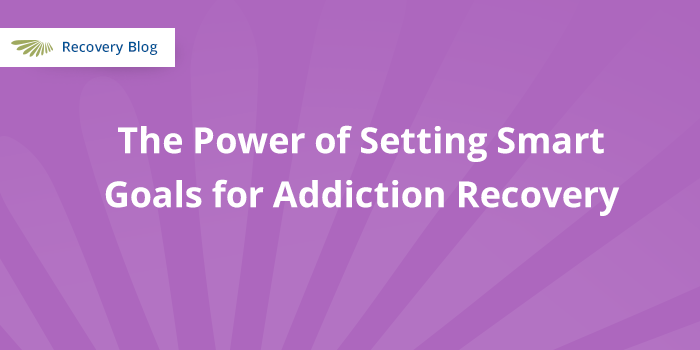Dual Diagnosis: How can anxiety affect my recovery?
Mental health and substance use disorders go hand in hand. At times it is difficult to separate one...

Setting goals is necessary in all aspects of life and substance use recovery is no different. Goals represent your vision and goal setting plots the road map to take you there. SMART Goals test the effectiveness of your goals and they fuel your dreams and awaken them to life. It is the first step towards achieving your dreams. Here is why you should consider setting goals that are Specific, Measurable, Achievable, Realistic, and Timely in your recovery journey.
Measurable
Setting SMART goals allows you to measure how effectively you are moving towards achieving your substance use recovery goals.
Optimum Use of Time and Resources
Setting SMART goals can help you to prioritize and invest your resources and time towards your goal.

Facilitates Planning
SMART goals provide specific details which will help you to forecast and plan by incorporating multiple activities into a single goal. For example, when you decide to change your lifestyle by investing in a new hobby, you can set a goal of starting bike riding, it allows you to specify the right equipment resources you will need, e.g. (helmet, shoulder and knee padding).
Goal focused
Focuses on converting your initial vision into small, achievable and actionable steps.
Provides Clarity for Decision Making
SMART Goals can provide a future direction for your life, which can guide you in your daily decision-making processes. Knowing what you are trying to achieve and how you are going to do that, guides your everyday decision-making process. Always ask yourself, “will this activity get me closer to my goal?”
Reduces Stress levels
Goals can help reduce stress. They provide guidance which can suppress the tendency to jump from one project or task to another instead of focusing on the most important goal. This will reduce stress levels relating to overall production and accomplishment levels.
Provides Specific Priorities
Vague goals are ignored goals and specific goals are monitored goals. Tasks are difficulty to complete without specific priorities and they can distract you from attaining your goals.
SMART goals are not vague in a nature. Their specificity will help you to track your priorities, limit distractions and to make modifications where necessary. These specifics also make it easier to visualize what success looks like.
Motivates and Eliminates Sense of Failure
SMART goals are measurable and that allows you to quickly identify missed targets in order to react quickly and make necessary changes. Goal attainment motivates and provides a fulfilling sense of accomplishment or mastery of a skill which eliminates the sense of failure that can prevent the you from working to achieve important milestones or setting goals in the future.
This also motivates you and gives a sense of containment and gratification, which will make you happier and more satisfied as an individual.
Increase Self Confidence Levels
When you make a conscious decision to set goals and achieve them, it reflects the amount of trust that you have placed in yourself to ‘get the job done.’ Once you have set and achieved a few goals, you will find that your self-confidence levels would have improved tremendously as well.
Setting SMART goals in recovery can help you or someone you know set realistic and achievable goals to maintain sobriety. You should also consider participating in an evidence-based addiction treatment program. This will help you build a strong foundation for recovery and can also be a good way to re-balance when you’re well into your recovery journey. Recovery from substance use disorder is possible, reach out today and get help.
Mental health and substance use disorders go hand in hand. At times it is difficult to separate one...
Are you looking to start your journey toward sobriety? It's a brave decision and one that requires...
In the USA, nearly 6 in 10 individuals who struggle with substance use disorder also experience...